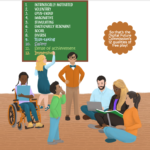
My focus this week has been elemental—literally. Air, earth, fire, water, wind. Here in northern California, where the “Camp Fire” still burns, the thick and toxic smoke from the fires is a harsh reminder of how interconnected we are, and how utterly dependent we all are on clean air, water, and soil. That’s my context this morning, and why I’m writing on the weekend instead of my typical Friday post. Friday I was preoccupied with breathing.
Reading is an act of contemplation . . . an act of resistance in a landscape of distraction . . . it returns us to a reckoning with time. —David Ulin
During a long drive this past Friday, I listened to several programs on NPR. In one, I was reminded of a book I have in my Kindle app by Alison Gopnick, The Gardener and the Carpenter: What the New Science of Child Development Tells Us About the Relationship Between Parents and Children. I made a mental note while driving to try reading it. I say “try reading it” because I find it hard to read entire books these days. I even forget what books I have—they get buried easily in the Kindle app. Yes, there’s search, but I have to know what I am searching for. In the case of the Gopnick book, reviewing my Amazon orders, I see I ordered it in January, 2017, and got partly through chapter 1. It took a book review on NPR to bring it to my awareness again.
In another program I listened to on the drive, Meghna Chakrabarti interviewed Maryanne Wolf, author of Reader, Come Home—the Reading Brain in a Digital World. Ironically, Reader, Come Home is another book I found buried in my Kindle app once I arrived at my destination, and I could see by my highlights, I made it further into this book on the first read when I purchased it in August than with the Gopnick book.
Author Maryanne Wolf is the director of UCLA’s Center for Dyslexia, Diverse Learners, and Social Justice. In the interview (which you can listen to here), Wolf contrasts a “contemplative, reflective mode” of reading with her present, screen reading mode which typically involves different styles of skimming. And she describes her own efforts to regain that essential skill of deep reading. This is how she explained an attempt to reread one of her favorite, intellectually-challenging novels:
It was like pouring molasses over my cerebral cortex. I couldn’t read it. I couldn’t focus. What I was doing was literally using a mode of reading that I use six to twelve hours a day…so I was using my screen mode of reading which was absolutely incapacitating me in terms of entering it.
As someone who easily spends 6 to 12 hours a day in screen mode, I can’t tell you how much I relate to this…not just with books, but even with longform journalism. What I appreciate about Maryanne Wolf is that she is not throwing out the importance and value of “screen reading mode.” She points out the necessity to reallocate time to deep reading processes…
So here’s an invitation: Join me for an experiment. We’ll read the book Reader, Come Home together, doing a similar process to Maryanne’s experiment that she describes in detail in the interview: 20 minutes a night (or morning or noon—whatever works for you, but I think choosing a particular time and being consistent might be useful), over 10–12 days. And we’ll discuss together in a Zoom video call at the end. During the 10–12 days, I’ll send out a daily email as a reminder and check-in. There’s no failure here, only awareness and insight. I am pretty certain the experience of at least attempting to read her book in depth will help us as we think about how, where, and when our children are reading, and the complex relationships with books and digital devices we all have today. And for those of us with children (and grandchildren) 0–5, I unabashedly believe her book is essential, thought-provoking reading. Of course, parents of children 0–5 will have the least amount of time to reallocate to any kind of reading, so for you, an audio version of the book is available on Audible. To participate, just respond to this email with “I’m in.” I will follow up.
Note: Interviewing Maryanne does seem a lot like herding kittens. I empathize with Meghna—it’s tough to fit Maryanne’s passion about the topic into a 49-minute conversation. But it’s a conversation worth reallocating your time to listen to…
Wishing you all renewing holidays and loving connections.


